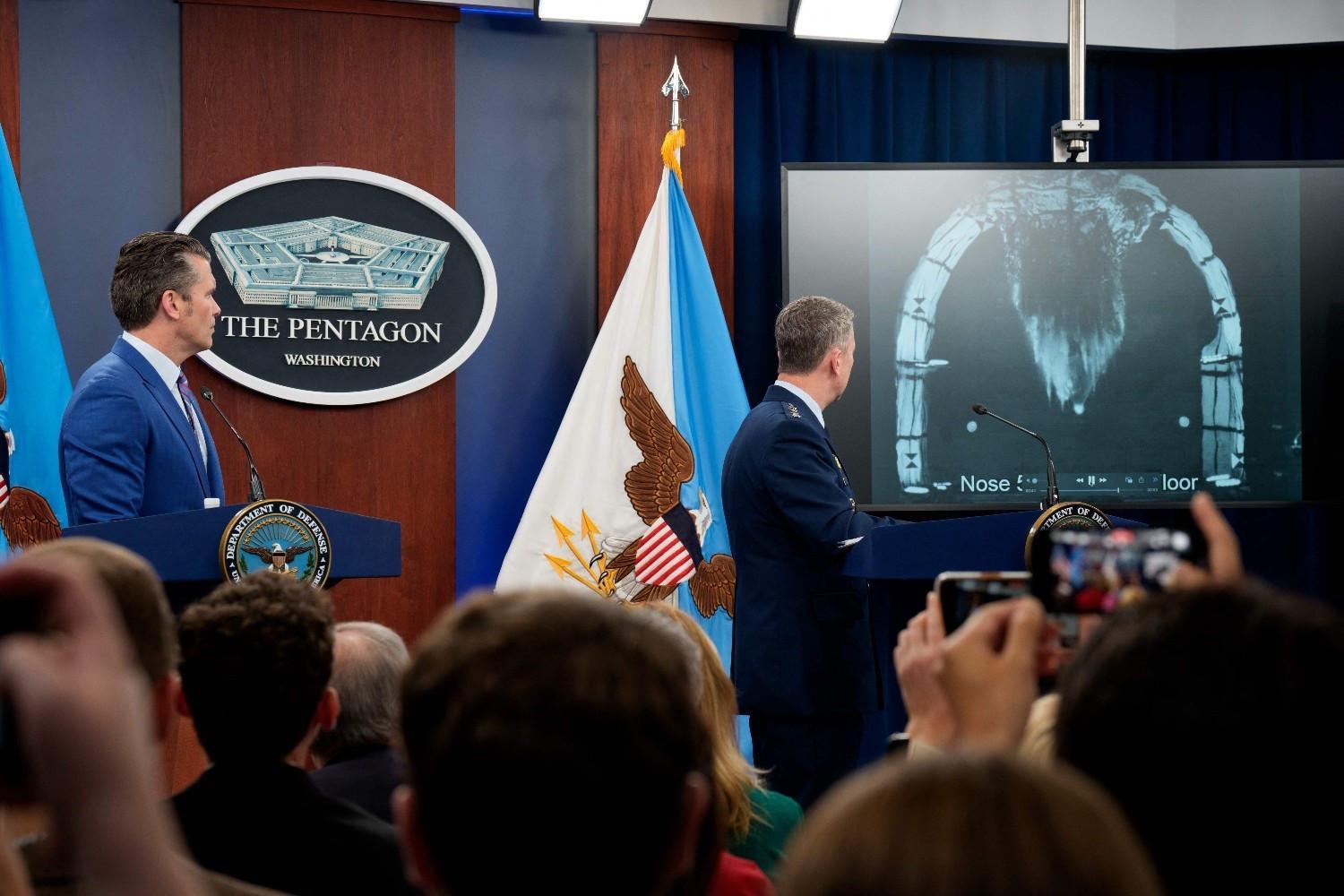
U.S. Defense Secretary Pete Hegseth (L) and Chairman of the Joint Chiefs of Staff Air Force Gen. Dan Caine (R) turn to watch a video of a bombing test of the GBU-57A/B Massive Ordnance Penetrator (MOP) used in the attack on the Iranian Fordow Fuel Enrichment Plant during a news conference at the Pentagon on June 26, 2025 in Arlington, Virginia.
Iran's top diplomat has said that the possibility of new negotiations with the United States on his country's nuclear program has been “complicated” by the American attack on three of the sites, which he conceded caused “serious damage."
U.S. President Donald Trump has suggested he is interested in new talks with Iran and said the two sides would meet next week. But Tehran denied a scheduled meeting.
In an interview on Iranian state television broadcast late on June 26, Foreign Minister Abbas Araghchi left open the possibility that his country would again enter talks on its nuclear program, but suggested it would not be anytime soon.
“No agreement has been made for resuming the negotiations,” he said. “No time has been set, no promise has been made, and we haven't even talked about restarting the talks.”
The American decision to intervene militarily “made it more complicated and more difficult” for talks on Iran’s nuclear program, Araghchi said.
Israel attacked Iran on June 13, targeting its nuclear sites, defense systems, high-ranking military officials and atomic scientists in relentless attacks.
The U.S. stepped in on June 22 to hit Iran's three most important strikes with a wave of cruise missiles and bunker-buster bombs dropped by B-2 bombers.
Trump said the American attacks “completely and fully obliterated” Iran's nuclear program, though Khamenei accused the U.S. president of exaggerating the damage.
In Washington, the true impact of the strikes has sparked sharp political and intelligence debates.
A leaked classified assessment suggested the damage to Iran's nuclear program may be less severe than initially claimed — possibly delaying progress by only a few months.
That contrasts with statements from senior U.S. officials.
CIA Director John Ratcliffe said several facilities would need to be "rebuilt over the course of years".
Pentagon chief Pete Hegseth accused the media of misrepresenting the operation.
He said the United States used massive GBU-57 bunker-buster bombs on Fordo and another underground site, while submarine-launched Tomahawk missiles targeted a third facility.
"President Trump created the conditions to end the war, decimating — choose your word — obliterating, destroying Iran's nuclear capabilities," Hegseth said.
Trump’s reported plan
Meanwhile, CNN on June 27 reported that the Trump administration has explored ways to encourage Iran to return to negotiations by considering a plan that could allow Tehran access to up to $30 billion in frozen assets.
The package would include easing certain sanctions and supporting the creation of a civilian nuclear energy program —though with strict limitations— according to four informed sources.
A Trump official said the U.S. would not fund the program directly and prefers Arab allies to cover the costs.
Despite ongoing military confrontations between Iran and Israel over the past two weeks, covert communications have taken place between American, regional and Iranian representatives, according to the report.
These behind-the-scenes efforts have reportedly persisted even after a ceasefire was agreed upon.
Officials from the Trump team have confirmed that various early-stage proposals are being considered.
While discussions remain fluid, one firm condition remains: Iran must completely halt uranium enrichment — a long-standing point of contention, as Tehran insists it needs enrichment capabilities for peaceful purposes.
According to two sources, some of the finer points were discussed during a confidential meeting at the White House last week between U.S. special envoy Steve Witkoff and officials from Gulf states.
According to Iran’s U.N. envoy Amir Saeid Iravani, Iran could consider accepting foreign investment in its energy sector and transferring enriched uranium abroad if a deal is reached.
In a written statement to Al-Monitor, he stressed that Iran remains determined to maintain domestic nuclear capabilities, though it is open to cooperation on reactor safety and fuel supply with regional countries, including through a multinational nuclear consortium.
Iravani said Iran may agree to transfer its 20 percent and 60 percent enriched uranium abroad under certain conditions. However, he noted that Iran will not negotiate over its missile program and rejects using Western investment as leverage.